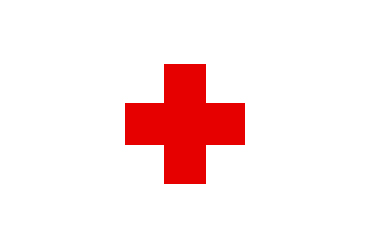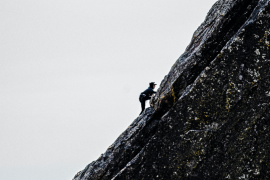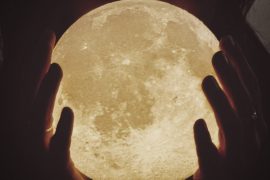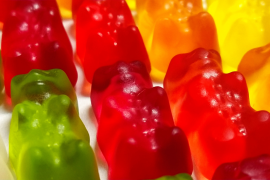Named a Finalist for 2018’s Best of the Net
AND THE BOY ACROSS THE FIELD is trying to beat the dog off of his arm, but it won’t un-bite. The animal’s thrashed and narrow body is boiling over with growls, its teeth deepened past the thin sleeve of his tired-green jacket.
We stand there watching, maybe thirty feet away and absolutely unsure of what to be. I break away from your hand and run towards the little fight, not knowing what I hope to do when I get there. From where you are, still leaning on the still-running car, the scene of injury can fit behind one of your fists set up in the chapped, exhausted air. Once I get close though, I can tell that the fight’s made of more hands than yours could blot out, if you were here. I can hear the boy’s screaming build as I get closer, ragged in the cold and full of holes and breaks where his voice drops out from underneath him like thin ice.
I used to play soccer, so I make a goal of the animal’s blazing rib cage, and it lets out a fear-wet yelp when contact is made, shoe to bone, the sensation burying beneath his fur and into his breathing. The dog unlatches and falls off the bleeding boy and I assume that I’ve done something very hard just quick enough to believe it was easy. The boy bends over, clasping and exhaling. The dog looks at us, its mouth still open as if it had something to say, but didn’t want to interrupt anyone. It thinks, and then it turns, and then I am grateful. It cuts fast, back through the razed corn. It had looked like it was smiling, even with its snout ridged and soaked with anger, curling like a contracting accordion, despite all this, something across its dark slot of tongue and lip looked close to joy.
The boy is on the ground, on his knees, trying to hold himself in. You are back behind us, near our car, which we pulled over, which is still playing Simon and Garfunkel’s Scarborough Fair, softly. I used to play things, things like harmonica and soccer and now the dog is gone. I used to play soccer and the dog has raced its dark yellow body off towards a white blur of barn over the hillside. I think there might cows there, just over the hill. You are walking now, coming close, maybe you can hear the boy. Your hand is still in the air though, which means you’re going to take it all in slowly and softly. The boy’s gone softer now too, less scary and bright and no longer barbed with screaming, so I decide your coming over might be okay. Now that he’s not yelling, he’s a little like the song and seems far away. Too far for me to hear him making any words, but still close enough for me to know he’s saying something with language in it while he breathes and whispers and holds. He’s letting out little seethes of cusses, trying to steam off whatever leftover dog is still percolating across his forearm.
“Hey,” I tell him. He looks up, face red and wet in places from the dog’s curled anger (or hunger or terror or misunderstanding or maybe just teeth).
“Hey,” he tells me back. His voice sags in the middle, going loose with shock (or hunger or terror or misunderstanding or maybe just teeth). He is maybe sixteen. I am maybe twenty. You are maybe still on your way over. When you get here, your hand takes mine again and I forget what I was trying to be for this boy. You don’t say anything. He stands up real slow. He is taller than me, than us. Younger than me and taller than us and more hurt than the whole day. At least on the arm, more hurt.
“You need anything?” I ask him. He is looking down at the blots on his sleeve, maybe trying to read them, maybe just trying to know about them.
“Damn,” he answers, not answering. Your hand tightens a little. I know you are not with me today, cannot remember how we got here, cannot piece together why we left our parents’ house from a window and in the middle of dinner, and cannot hold yourself still enough to press your voice onto words. This is okay. This dog-streaked boy does not have to know you. There’s nothing you have to do but get through this, I will do the soccer of it today, you just try to hold on. Scarborough Fair ends and the boy is still looking at his arm. Our car is red and small and shitty and its doors are open and it looks sort of like a ladybug trying to fold its black wings in and not being able to.
“You need something?” I try again. He looks away from his emergency and glances over at us.
“Thanks,” he manages to say.
“Yeah, sure, anytime. I used to play soccer, so it wasn’t hard, y’know, at least not from the knee-down. I’m just very glad it worked.” And I’ve told him too much, but he forgives me by being quiet and holding his arm to his chest. That dog is somewhere. I think about that until I notice his face and remember what happened and that it’s all still happening to him.
“What do you need?” I try again, hoping my voice sounds clear, hoping he hears me above the crashing blur of being hurt very quickly and very personally. He looks at me and then he looks at you and I feel you flinch a little, not sure that you want to be here, not sure that you can hold onto his eye-contact when it’s so close and so blue and so much made of a need he won’t share, even though it’s obvious.
“A bandage, or something,” he replies. A feeling of gratification floods past my skin and into my breathing— only he could have said it, out of everyone who’s here, he’s the only one who could have asked, and I’m so so glad he managed to do it.
“Good idea,” I say, because it is a good idea, and I let that sink in. I hope he can feel good about it, his idea because even if it’s obvious, it’s still very good. Something slips out of him, maybe its the sharpness, the aggression of being aggressed melting out of his eyes, that slips out and he looks even softer and farther away. You relax because he seems to have forgotten about you. You might be forgetting about you, too.
“Yeah,” he admits, “a good idea.” I look at his arm and realize that it’s too much. Too soaked, too far, too fascinating.
“Hey,” I offer.
“Hey,” he tells me.
“That’s too much,” I say pointing at his hurting arm.
“Hemophiliac,” he shrugs, sort of smiling like that dog was sort of smiling. He says hemophiliac like I say harmonica, like he’s both embarrassed and over-proficient in something very specific and unnecessary, something very specific and unnecessary he has with him all the time. I thumb the hollow rectangle in my pocket and think about how I know how to play Scarborough Fair.
“Oh,” you say, and you say it quiet because you worry about being rude, even though you never are, but that’s okay, it’s okay to worry and I will let you worry and we’ll be good, sometime later, we’ll be very good.
“Do you need anything?” you ask him, and I’m impressed with how you are and I think he is too.
“No thanks,” he says back, very soft, very slow, because you’re just a kid. Then he looks at me. “Nothing unless you have a bandage in your car or you can move the hospital that’s forty miles away to right here in front of us.” And as I’m thinking that I can’t move hospitals, you take off your sweater very quickly and start to wrap it around his sleeve and we look at you like you just promised to kill us both. This means we are very impressed with you.
“She’s six but she’s smart,” I tell him and he nods and sees that you’re about to get cold because now your red sweater is coiled around his red arm and I think that maybe, maybe he feels sorry about this. And the three of us stand in the field and try to beat the rest of the dog off the day. We all press on this one boy’s forearm who is not scared enough and we stand and know that we’ll have to start walking and running and maybe yelling soon, fingers darting across telephone screens and voices smearing into fast heartbeats so they can come back afraid enough to be real, that is all coming at us like something angry from the across the empty swath of flattened cornstalks.
I take a moment to wonder where the dog is—what the dog was—where this kid’s car or mother or intentions are parked and whether or not they’ve broken down. But I drop this and follow your intelligent lead and we just work to hold him in. We press and stand and I look at the obviousness of your sweater on this boy’s arm, how it seems easy but might have been hard, and I love you and we hold him and I see that your fist is down by your side again and has uncoiled back into a hand, not a way of crossing out certain bits of light, which means that you’re looking at us and him and this, so I decide that, since you have decided to see him, I will take my phone out and try to move the hospital after all.
Claire Oleson is a queer writer hailing from Grand Rapids Michigan. She’s currently studying English and Creative Writing at Kenyon College. She’s an avid fan of books, bread, and trying to win the hearts of all felines, regardless of how cantankerous they may be. Her work has been published by the University of Kentucky’s graduate literary journal Limestone, Siblíní Art and Literature Journal, Newfound Journal, NEAT Magazine, Werkloos Magazine, and Bridge Eight Literary Magazine among others.
Read more stories by Claire
Claire’s stories appear in Bridge Eight print issues “Breathing Life into Colorless Spaces (Issue 4)” and “Archetypes (Issue 6).”
GO TO PRINT ISSUESLike what you’re reading? Get new stories sent to your inbox every Monday.
Drop your email below to start >>>




